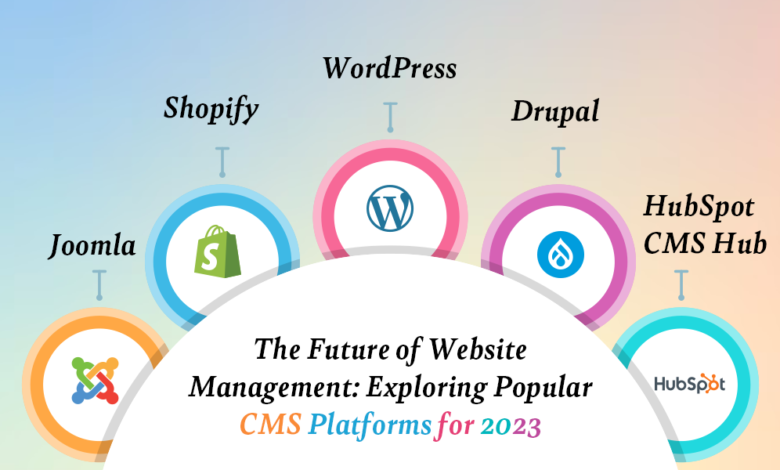The Future of Website Management: Exploring Popular CMS Platforms for 2023

In the ever-evolving landscape of website management, Content Management Systems (CMS) play a crucial role in empowering businesses to create, organize, and manage their digital content effectively. As we step into 2023, it’s essential to explore the top CMS platforms that can revolutionize the way websites are built and managed. In this article, we will delve into the future of website management by exploring the top CMS platforms for 2023.
WordPress.org
WordPress is the leading CMS platform, powering millions of websites worldwide. It offers a flexible and customizable framework that caters to a wide range of website types, from blogs and portfolios to e-commerce stores and corporate websites.
Key Features and Benefits
- Extensive Themes and Plugins: WordPress.org provides an extensive library of themes and plugins, allowing users to customize their website’s design and functionality.
- User-Friendly Interface: The intuitive and user-friendly interface makes it easy for both beginners and experienced users to manage and update their websites.
- SEO-Friendly: WordPress.org offers built-in SEO features and supports various plugins to enhance search engine visibility and improve rankings.
- Active Community Support: With a vast community of developers and users, WordPress.org provides a wealth of resources, support forums, and tutorials.
WordPress.org continues to evolve with regular updates and improvements. Key future developments include enhanced block editing capabilities through the Gutenberg editor, improved performance and security measures, and a focus on accessibility.
Drupal
Drupal is a powerful open-source CMS platform known for its robustness, scalability, and security. It is highly suitable for large and complex websites that require advanced functionality and customization.
Key Features and Benefits
- Advanced Customization: Drupal offers extensive customization options, allowing developers to create highly tailored websites with complex structures and functionality.
- Scalability and Performance: Drupal’s architecture enables it to handle high-traffic websites efficiently and maintain optimal performance.
- Security: Drupal has a strong focus on security, making it a preferred choice for government, enterprise, and highly regulated industries.
- Multilingual Support: Drupal provides robust multilingual capabilities, making it suitable for websites with a global audience.
Future developments in Drupal focus on improving user experience, enhancing performance and scalability, and streamlining the development process through the adoption of modern technologies and best practices.
Joomla
Joomla is a popular open-source CMS platform that offers a balance between ease of use and customization capabilities. It is suitable for a wide range of website types, including blogs, corporate websites, and e-commerce stores.
Key Features and Benefits
- User-Friendly Interface: Joomla provides a user-friendly interface that simplifies content management and website administration.
- Flexible and Extensible: With a vast selection of extensions and templates, Joomla allows users to customize their websites according to their specific needs.
- Multilingual Support: Joomla offers built-in multilingual capabilities, enabling the creation of websites in multiple languages.
- Active Community: Joomla has a vibrant community that contributes to its development and provides support through forums and resources.
Joomla’s future developments focus on enhancing usability, improving performance, and optimizing the CMS for modern web standards. It also aims to strengthen its e-commerce capabilities to meet the growing demand for online stores.
Shopify
Shopify is a CMS platform specifically designed for e-commerce websites. It provides a complete solution for creating and managing online stores, including product management, order processing, and secure payment integration.
Key Features and Benefits
- E-commerce Focus: Shopify offers a range of features tailored specifically for online stores, including inventory management, customizable product catalogs, and secure payment gateways.
- Easy Setup and Use: Shopify simplifies the process of setting up an online store, making it accessible to entrepreneurs and small businesses.
- Mobile-Optimized: Shopify provides mobile-responsive themes and a mobile app, allowing merchants to manage their stores on the go.
- App Store: Shopify’s app store offers a wide selection of plugins and extensions to extend the platform’s functionality.
Shopify’s future developments aim to enhance the platform’s scalability, expand its international capabilities, and provide more tools for merchants to customize their stores and improve customer experience.
HubSpot CMS Hub
HubSpot CMS Hub is a robust content management system that integrates seamlessly with HubSpot’s marketing and sales tools. It offers a comprehensive solution for managing content, generating leads, and tracking customer interactions.
Key Features and Benefits
- Seamless Integration: HubSpot CMS Hub integrates seamlessly with HubSpot’s marketing and sales tools, enabling businesses to streamline their marketing efforts and personalize user experiences.
- Drag-and-Drop Editor: The user-friendly drag-and-drop editor simplifies content creation and website customization.
- Personalization and Dynamic Content: HubSpot CMS Hub allows for personalized content delivery based on user behavior and preferences, enhancing user engagement.
- Powerful Analytics and Reporting: HubSpot provides extensive analytics and reporting features, allowing businesses to track website performance and optimize their marketing strategies.
HubSpot CMS Hub’s future developments aim to further enhance personalization capabilities, improve SEO tools, and provide more advanced reporting features to help businesses measure and optimize their website’s impact on their overall marketing and sales efforts.
Magento
Magento is a powerful open-source CMS platform specifically designed for e-commerce websites. It provides robust features and scalability to meet the needs of small businesses as well as large enterprises.
Key Features and Benefits
- E-commerce Focus: Magento offers a comprehensive suite of e-commerce features, including inventory management, product catalogs, payment integration, and order processing.
- Customization and Flexibility: Magento allows for extensive customization and flexibility, enabling businesses to create unique and tailored online stores.
- Scalability: With its scalable architecture, Magento can handle high levels of traffic and support the growth of e-commerce businesses.
- SEO-Friendly: Magento provides built-in SEO features and optimization options to enhance the visibility of online stores in search engine results.
Magento’s future developments focus on improving performance, enhancing user experience, and providing advanced features for personalization, artificial intelligence, and mobile commerce.
TYPO3
TYPO3 is a versatile open-source CMS platform known for its flexibility and scalability. It is suitable for a wide range of websites, from small business websites to large enterprise portals.
Key Features and Benefits
- Extensibility: TYPO3 offers a wide range of extensions and modules that can be easily integrated to add functionality and meet specific website requirements.
- Multilingual Support: TYPO3 provides robust multilingual capabilities, making it suitable for global websites with multiple language versions.
- Scalability and Performance: TYPO3’s architecture allows for scalability, making it suitable for websites with high traffic and complex content structures.
- User-Friendly Interface: TYPO3 features an intuitive and user-friendly interface that simplifies content management and website administration.
TYPO3’s future developments focus on improving user experience, enhancing performance and security, and incorporating modern web technologies and standards.
Umbraco
Umbraco is a flexible and user-friendly open-source CMS platform based on Microsoft .NET technology. It is known for its simplicity and customization capabilities.
Key Features and Benefits
- Easy-to-Use Interface: Umbraco offers a clean and intuitive interface, making it easy for users to create, manage, and publish content.
- Customization and Extendability: Umbraco allows for extensive customization and integration with third-party tools and services.
- SEO-Friendly: Umbraco provides built-in SEO features and supports search engine optimization best practices.
- Active Community: Umbraco has a vibrant community that contributes to its development and provides support through forums and resources.
Umbraco’s future developments focus on improving the user experience, expanding its ecosystem of extensions and packages, and integrating emerging technologies to stay ahead of evolving web trends.
Wix
Wix is a popular cloud-based CMS platform that offers a simple and user-friendly approach to website creation. It caters to users with little to no technical knowledge and provides a range of templates and drag-and-drop design tools.
Key Features and Benefits
- Easy Website Creation: Wix’s intuitive interface and drag-and-drop functionality make it easy for beginners to create professional-looking websites.
- Template Selection: Wix offers a wide range of templates for different industries and website types, allowing users to quickly get started.
- App Market: Wix has an app market that provides additional features and functionality to enhance websites.
- Hosting and Security: Wix takes care of website hosting and provides built-in security features to protect user data.
Wix’s future developments focus on expanding its capabilities for e-commerce, advanced design options, and incorporating AI technologies to enhance user experience and website performance.
Squarespace
Squarespace is a popular all-in-one CMS platform that offers a seamless website building experience. It combines website design, hosting, and content management into a single platform.
Key Features and Benefits
- Design and Templates: Squarespace provides stunning and responsive templates, allowing users to create visually appealing websites without any coding knowledge.
- Mobile Optimization: Squarespace ensures that websites are mobile-friendly and optimized for different devices and screen sizes.
- Integrated Analytics: Squarespace offers built-in analytics tools to track website performance and visitor behavior.
- E-commerce Capabilities: Squarespace provides features for building and managing online stores, including inventory management and secure payment integration.
Squarespace’s future developments focus on expanding e-commerce capabilities, enhancing design options, and improving integration with third-party services and platforms.
PrestaShop
PrestaShop is a popular open-source CMS platform specifically designed for e-commerce websites. It offers a comprehensive suite of features and a user-friendly interface, making it suitable for businesses of all sizes.
Key Features and Benefits
- E-commerce Focus: PrestaShop provides robust e-commerce features, including product management, inventory control, payment integration, and order processing.
- Customization Options: PrestaShop offers a wide range of themes, templates, and extensions, allowing businesses to customize their online stores to meet their unique requirements.
- International Support: PrestaShop supports multiple languages and currencies, making it ideal for businesses with a global customer base.
- SEO-Friendly: PrestaShop includes built-in SEO features and supports best practices for optimizing online stores for search engines.
PrestaShop’s future developments focus on improving user experience, enhancing mobile responsiveness, and expanding its integrations with popular payment gateways and shipping providers.
Sitecore
Sitecore is a powerful CMS platform known for its scalability and personalization capabilities. It caters to businesses looking for a comprehensive solution that integrates content management, marketing automation, and customer experience management.
Key Features and Benefits
- Personalization and Customer Experience Management: Sitecore enables businesses to deliver personalized content and experiences based on user behavior, preferences, and demographics.
- Multichannel Marketing: Sitecore allows businesses to manage and deliver consistent content across various channels, including websites, mobile apps, email, and social media.
- Analytics and Insights: Sitecore provides robust analytics and reporting features, allowing businesses to gain valuable insights into customer behavior and optimize their marketing efforts.
- Scalability and Security: Sitecore’s architecture ensures scalability, performance, and security for websites and applications of all sizes.
Sitecore’s future developments focus on further enhancing personalization capabilities, improving marketing automation features, and leveraging artificial intelligence and machine learning technologies.
Contentful
Contentful is a headless CMS platform that focuses on content management and delivery. It separates content from presentation, allowing businesses to deliver content across multiple platforms and devices.
Key Features and Benefits
- Content Delivery across Channels: Contentful enables businesses to manage and deliver content to websites, mobile apps, smart devices, and other digital platforms.
- API-First Approach: Contentful’s API-first architecture provides flexibility and allows developers to integrate content seamlessly into their applications.
- Collaboration and Workflow: Contentful offers collaboration features, such as content editing, version control, and approval workflows, to streamline content creation and publishing processes.
- Scalability and Performance: Contentful’s cloud-based infrastructure ensures scalability, performance, and high availability for websites and applications.
Contentful’s future developments focus on enhancing its content management capabilities, improving localization and internationalization features, and expanding its integrations with third-party services and technologies.
Webflow
Webflow is a visual CMS platform that combines website design, development, and content management in one interface. It empowers designers to create custom websites without coding while providing powerful CMS functionality.
Key Features and Benefits
- Visual Website Design: Webflow’s visual design tools allow designers to create responsive and visually stunning websites without writing code.
- Content Management: Webflow offers a robust content management system that enables businesses to manage and update content easily.
- Hosting and Security: Webflow provides hosting and ensures the security and performance of websites.
- Integrations and APIs: Webflow allows for integrations with various third-party services and provides APIs for developers to extend its functionality.
Webflow’s future developments focus on expanding e-commerce capabilities, improving collaboration and team workflows, and enhancing integration options with popular tools and services.
Adobe Commerce
Adobe Commerce, formerly known as Magento Commerce, is a comprehensive CMS platform tailored for e-commerce businesses. It combines powerful features for online store management, marketing, and customer experience.
Key Features and Benefits
- E-commerce Features: Adobe Commerce offers a wide range of e-commerce features, including catalog management, order processing, payment integration, and marketing automation.
- Customization and Scalability: Adobe Commerce provides extensive customization options and scales to meet the needs of small businesses to large enterprises.
- Marketing and Personalization: Adobe Commerce includes robust marketing tools, personalization capabilities, and advanced customer segmentation options.
- Integration with Adobe Experience Cloud: Adobe Commerce seamlessly integrates with other Adobe Experience Cloud products, allowing businesses to create personalized and unified customer experiences.
Adobe Commerce’s future developments focus on enhancing the platform’s performance, scalability, and security, as well as leveraging AI and machine learning technologies to drive personalized customer experiences.
Conclusion
As we step into 2023, the future of website management is bright with a range of powerful CMS platforms to choose from. Whether you’re looking for a versatile solution like WordPress.org, a robust CMS for complex websites like Drupal, a balance between ease of use and customization like Joomla, an e-commerce-focused platform like Shopify, or an integrated solution with marketing and sales tools like HubSpot CMS Hub, the key is to select the CMS that best aligns with your business goals and requirements. Stay ahead of the curve by leveraging these popular CMS platforms to create and manage impactful websites in the dynamic digital landscape of 2023 and beyond.
World Web Technology is a leading provider of custom CMS development services, offering expertise in creating bespoke solutions for businesses of all sizes. With a team of experienced developers and designers, they work closely with clients to understand their specific requirements and deliver a CMS that empowers them to manage their website content efficiently and effectively.




